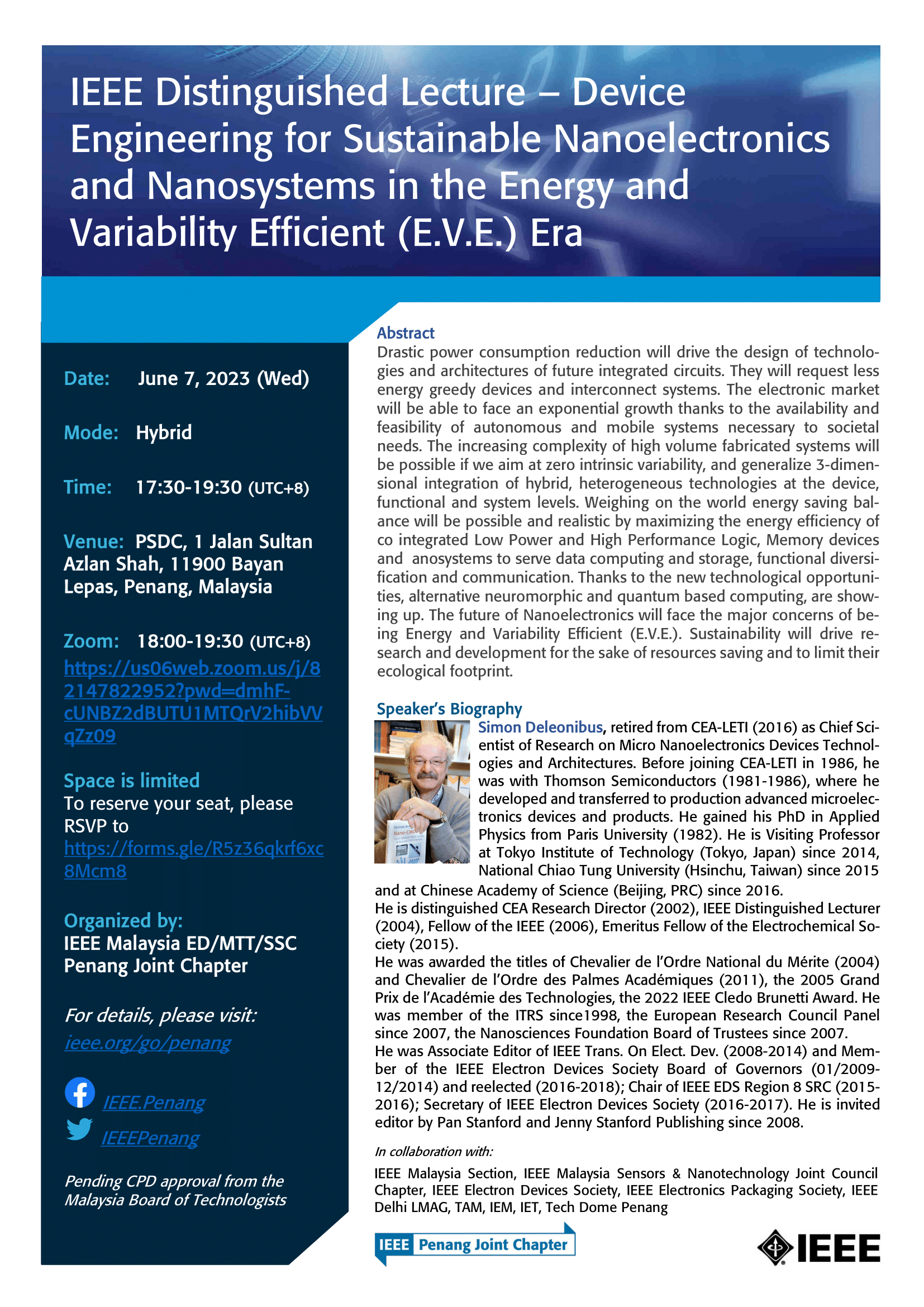IEEE Distinguished Lecture – Device Engineering for Sustainable Nanoelectronics and Nanosystems in the Energy and Variability Efficient (E.V.E.) Era
“Device Engineering for Sustainable Nanoelectronics and Nanosystems in the Energy and Variability Efficient (E.V.E.) Era” by Simon Deneonibus, PhD, IEEE Fellow and IEEE Distinguished Lecturer.
Date: June 7, 2023 (Wednesday)
Mode: Hybrid
Time: 17:30 to 19:30 (UTC+8)
Venue: PSDC, 1 Jalan Sultan Azlan Shah, 11900 Bayan Lepas, Penang, Malaysia [Google Map]
Zoom: 18:00-19:30 (UTC+8) https://us06web.zoom.us/j/82147822952?pwd=dmhFcUNBZ2dBUTU1MTQrV2hibVVqZz09
RSVP: https://forms.gle/R5z36qkrf6xc8Mcm8
All are cordially invited to attend. Admission is FREE. Refreshment will be served from 17:30. The approval code for Continuing Professional Development (CPD) by Malaysia Board of Technologists (MBOT) is MBOTATP/23/04/29.
Abstract
Drastic power consumption reduction will drive the design of technologies and architectures of future integrated circuits. They will request less energy greedy devices and interconnect systems. The electronic market will be able to face an exponential growth thanks to the availability and feasibility of autonomous and mobile systems necessary to societal needs. The increasing complexity of high volume fabricated systems will be possible if we aim at zero intrinsic variability, and generalize 3-dimensional integration of hybrid, heterogeneous technologies at the device, functional and system levels. Weighing on the world energy saving balance will be possible and realistic by maximizing the energy efficiency of co integrated Low Power and High Performance Logic, Memory devices and anosystems to serve data computing and storage, functional diversification and communication. Thanks to the new technological opportunities, alternative neuromorphic and quantum based computing, are showing up. The future of Nanoelectronics will face the major concerns of being Energy and Variability Efficient (E.V.E.). Sustainability will drive research and development for the sake of resources saving and to limit their ecological footprint.
Speaker
Simon Deleonibus, retired from CEA-LETI (2016) as Chief Scientist of Research on Micro Nanoelectronics Devices Technologies and Architectures. Before joining CEA-LETI in 1986, he was with Thomson Semiconductors (1981-1986), where he developed and transferred to production advanced microelectronics devices and products. He gained his PhD in Applied Physics from Paris University (1982). He is Visiting Professor at Tokyo Institute of Technology (Tokyo, Japan) since 2014, National Chiao Tung University (Hsinchu, Taiwan) since 2015 and at Chinese Academy of Science (Beijing, PRC) since 2016.
He is distinguished CEA Research Director (2002), IEEE Distinguished Lecturer (2004), Fellow of the IEEE (2006), Emeritus Fellow of the Electrochemical Society (2015).
He was awarded the titles of Chevalier de l’Ordre National du Mérite (2004) and Chevalier de l’Ordre des Palmes Académiques (2011), the 2005 Grand Prix de l’Académie des Technologies, the 2022 IEEE Cledo Brunetti Award. He was member of the ITRS since 1998, the European Research Council Panel since 2007, the Nanosciences Foundation Board of Trustees since 2007.
He was Associate Editor of IEEE Trans. On Elect. Dev. (2008-2014) and Member of the IEEE Electron Devices Society Board of Governors (01/2009-12/2014) and reelected (2016-2018); Chair of IEEE EDS Region 8 SRC (2015-2016); Secretary of IEEE Electron Devices Society (2016-2017). He is invited editor by Pan Stanford and Jenny Stanford Publishing since 2008.

